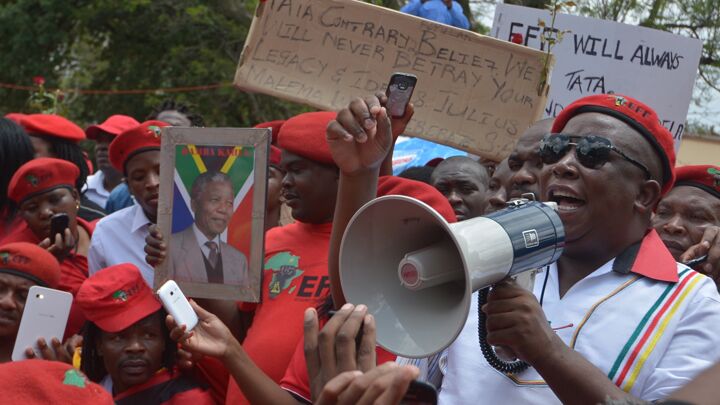
Malema Vows to Continue Mandela’s Militant Legacy
As dignitaries arrived at Nelson Mandela’s memorial service last Tuesday, Julius Malema and a delegation from his political party, the Economic Freedom Fighters, greeted them with song. “Thiba ka moo re bolaya ntswa tsena,” they sang as dignitaries walked into the stadium. In English, this translates: “Keep watch there, we are killing these dogs.”
These verses are well known in South Africa as part of a militant hymn calling for the killing of white Afrikaners.
Days later, Malema led a crowd of eff followers to Mandela’s house in Houghton to lay flowers and pay tribute. During his speech, Malema recounted how most people chose to remember Mandela as he was after his release from prison in 1994 rather than focusing on his early years as a militant leader in the struggle against apartheid. He promised to speak more about Mandela’s early years in the near future.
“People are distorting Nelson Mandela today,” he shouted. “Viva the militant Nelson Mandela, viva.”
Now that Mandela is gone, Malema told his followers, the Economic Freedom Fighters will take up his struggle. “Thank you [Mandela] for ushering in political freedom,” he said. “Those who came after you failed to deliver economic freedom. We are picking up this battle. … We salute Raul Castro, we salute President Mugabe. We have no business saluting Prime Minister of Britain [David Cameron].”
Julius Malema’s eff movement was founded last July on a pledge to nationalize South African banks and redistribute South African land. The party has already attracted considerable publicity by sporting red berets, using Communist jargon and praising the state assets seizers of Zimbabwe and Venezuela.
“We are a protest movement,” Malema told a July 11 press conference in Johannesburg. “We have got a completely different plan. Ours is expropriation of land without compensation. We want to nationalize, and those mines we want to nationalize, we are not going to pay for them. Our enemy number one is monopoly capital.”
According to the party’s manifesto, the South African government should “transfer all land to the state, which will administer and use land for sustainable development purposes.” Once land is under state control, the manifesto dictates that those wishing to use it would have to apply for a land-use license, which would be valid for 25 years and could be renewed at the government’s discretion.
As unemployment soars, Malema’s new party is primarily targeting the 50 percent of young black South Africans who are out of work and whose living conditions have not improved in the 19 years since the end of apartheid. Even political analyst Nic Borain—who described eff leadership as “the clowns and fools of our politics”—said the party could take up to 5 percent of the vote in the 2014 election.
Such a percentage would be enough to influence any future government in a more racist/Marxist direction. As Frans Cronje, deputy chief executive officer of the Johannesburg-based Institute for Race Relations, said in a 2011 interview: “It doesn’t take a majority of black South Africans in order to drag the country into a racial mess. It takes a few characters like Malema with the tacit consent of the anc,” the African National Congress, country’s governing party.
For more in-depth analysis on the legacy of Nelson Mandela and the future of South Africa, watch Stephen Flurry’s latest Trumpet Daily episode, “The Truth About Nelson Mandela and South Africa.”
